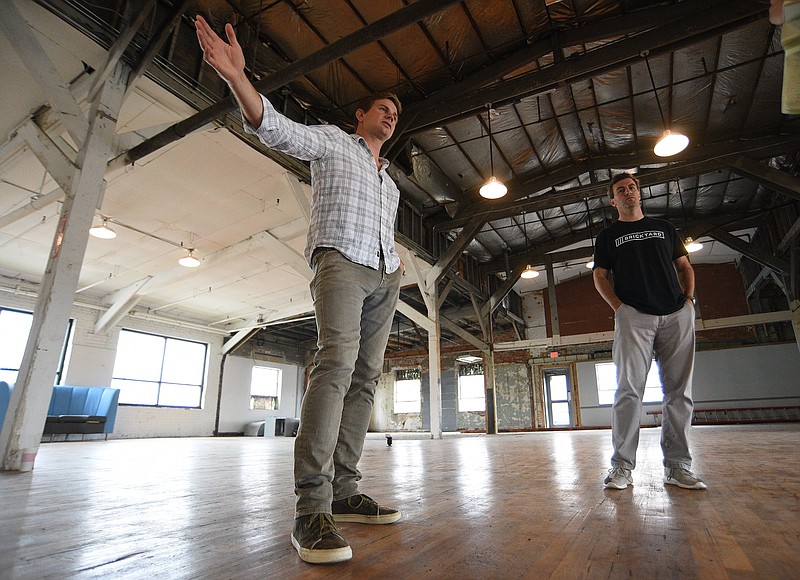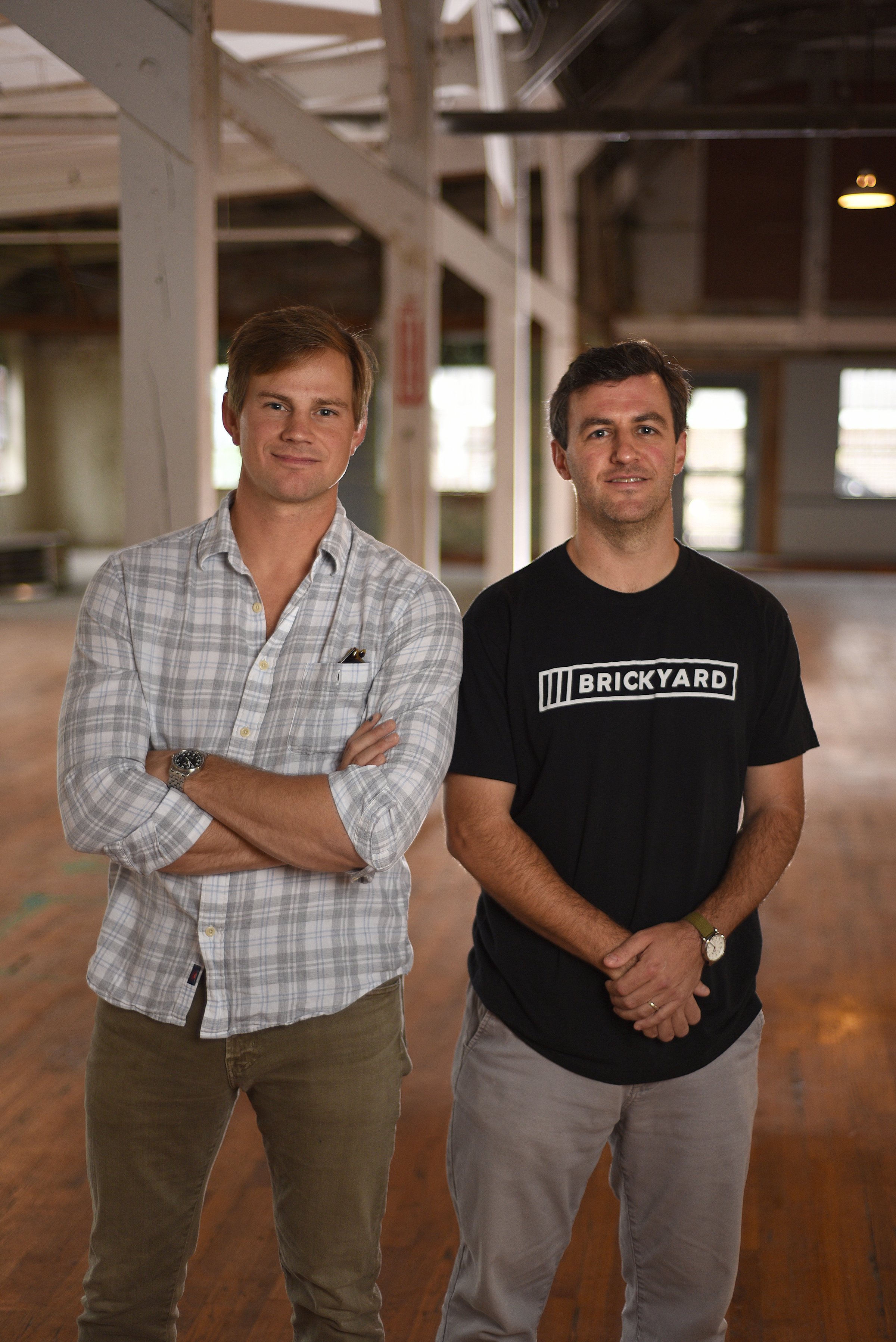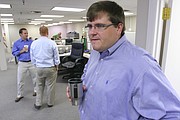Standing in the sun-splashed warehouse space that will become Brickyard, Cam Doody can't help but grin as he imagines the collective misery that will happen here.
"Everyone is suffering in their own gauntlet," says Doody, who is a veteran of exactly the kind of pain he's describing. "They're working 100 hours a week."
The prospect might not appeal to most people, but Doody and his business partners aren't building Brickyard for most people. The high-octane hothouse for founders from all over the country is attracting startup junkies who thrive in exactly this sort of grind.
"You're eating glass, and it's really nice when you have other people choking down glass with you," says Tamara Zubatiy, the co-founder of an early stage company called Barometer.
Zubatiy is a native of Ukraine who grew up in California and will relocate to Chattanooga from Atlanta to hunker down at Brickyard and build her business. She and Barometer co-founder Grant Nelson make up one of five teams that have committed to the new venture, and they'll move to the Scenic City in November.
"We've been working alone, but entrepreneurship is really a grind," Zubatiy says. "We're looking forward to just talking to other founders again."
That combination of camaraderie and commitment is exactly what the five startup veterans behind Brickyard have in mind.
Doody and his business partner Matt Patterson were co-founders of moving industry upstart Bellhop, launched in 2012 with funding and mentorship from Lamp Post Group, a startup incubator created by entrepreneurs Allan Davis, Barry Large and Ted Alling.
"Our first money was raised was here, and that brought us here," Patterson says. "Bellhop has raised $90 million, but our first million was here."
A decade earlier, in 2002, Davis, Alling and Large launched Access America Transport in the back office of Large's father's brickyard business. Access America had 800 employees and sales of $600 million by the time the partners sold it to Chicago-based Coyote Logistics in 2014. A year later, UPS bought Coyote for $1.8 billion.
Mentoring the next generation of founders at Brickyard is more than just a business proposition for the five entrepreneurs, Davis says. It's an opportunity to use their hard-won knowledge to support their fellow startup obsessives.
"[Other] investors may be rich and well-connected, but they don't remember how it feels to be stressed out and have those crazy emotional roller coasters," he says. "There's a lot of empathy that goes into funding a high-growth, high-stress, [venture capital]-backed company."
Coming to Brickyard
Five teams have signed on to call Brickyard home while they build their businesses.Marketbasemarketbase.appCofounders Jordan Isip and Carlos Rodriguez-Rosario just went through the Y Combinator business accelerator. Their startup helps businesses easily add an online marketplace to reach their existing customers.REPOWRrepowrtransport.comCofounders Patrick Visintainer and Spencer Ware, are moving to Brickyard from Birmingham. Their business is a network marketplace for business-to-business truck and trailer rentals.Joonjoonapp.io/landing/2The three founders, Issac Eaves, Brad Brenner and Kevin Bunarjo, will move to Chattanooga from California. Joon uses gaming to encourage young people to engage in real-world activities that build their health and character.Barometerthebarometer.co/landingCofounders Tamara Zubatiy and Grant Nelson will move to Chattanooga from Atlanta. Their startup scans large amounts of text to detect and flag editorial bias.Brevbrev.devFounders and Y Combinator alums Nader Khalil, Alec Fong and Ali Ahmed will move to Chattanooga from California. Brev provides faster, more efficient, more accessible computing by moving functions online.
Burn the ships
The five Brickyard partners have created a $5 million, evergreen fund to write checks to founders of promising early stage businesses, but they say money isn't the main draw.
"We're a small part of the funding round," Doody says. "Our typical check size is $250,000, but these founders are out raising millions. We're buying a small piece of that, and bringing them here."
That last part - bringing them here - is the heart of the deal. The founders must bail out of the big cities where most of them live, dig in together in a town most of them have never heard of, and go all in with the mentors running this experiment.
"We were really bought into what they were trying to do as a thesis: be heads-down, the focus, burn the ships, avoid distractions," says Isaac Eaves, a co-founder of early stage startup Joon, who will move here from California with his two co-founders.
"You can tell Cam and Matt understand what that founder experience is like," Eaves says. "They're going to make really great mentors, and we'll be surrounded by other founders with that mindset, as well."
Brickyard is based in an unassuming warehouse just off Central Avenue where it intersects with Main Street. The low-slung, 12,000-square-foot building was once storage for rugs, and it boasts big windows and lots of natural light, as well as a partial view of Lookout Mountain. New housing is going up on the next block, and a brewery is moving in across the street. It's a very happening corner that was, until recently, almost entirely light industrial.
But while the appeal of Chattanooga may be part of the deal, the founders aren't coming here for the brews or the views, Doody says. Instead, the value proposition of the city is its relatively low profile, and the fact that these newcomers will pull up stakes and come here to work nonstop.
"It's an exciting place to be, but you're not in the middle of the rat race," Doody says. "Exiting the rat race, building unencumbered, is the best thing you can do."
The founders don't have to commit to any particular timeframe at Brickyard to get this deal, and they don't have to promise to stay here, but Davis anticipates some of them will lose their hearts to Chattanooga.
"I don't see a scenario where every single person we bring here will stay, but I think a good portion will," he says. "Some people will fall in love with it, and they'll stay. These will be people that love the city that have the ability to make big impacts."
That possibility has major implications for Chattanooga's future as both a startup hotbed and as a diverse, thriving city, Alling says.
"It's going to change the whole community," he says.
Catching Tailwinds
There was a time not too long ago when this audacious idea might have fallen flat.
"Work from anywhere is changing everything," Doody says. "That plays really well into Chattanooga. These founders five to seven years ago could not move to a city like this because of access to talent, but the talent is moving here."
Data from Bellhop clearly shows a major shift from major metropolitan cities into mid-sized and small communities as remote work has morphed from emergency measure to expectation, Doody says.
"We have this gift of this giant tailwind of talent," he says. "We need to pour gas on the fire."
But that doesn't mean everyone has to be together to get things done, Doody adds. The founders need to be on site at Brickyard as they get rolling, but their approach to hiring is totally up to them, he says.
If they grow their in-person workforce and need help finding more space, Brickyard has commercial real estate partners at the ready. If they opt for an all-remote workforce, they can stay put and keep building.
"You don't know what you'll get with a startup," Doody says. "They may hire 20 people a month in a year. There's no term around how long you have to stay. When they start outgrowing the space, we'll do everything we can to help them."
And the founders have very different feelings about how much remote work is the right amount. Zubatiy embraces the concept, she says.
"We have a fully remote team," she says. "That talent is not localized. Good talent that knows their worth isn't going to be sticking around, anyway."
Meanwhile, the website for Brev advertises the company as "intensely non-remote in San Francisco and Chattanooga."
"I don't love remote work," says Brev co-founder Nader Khalil, who will move to Brickyard with his fellow co-founders in early 2022. "I think there's magic in being together. We forget you're supposed to enjoy and get close to the people you work with. I don't want to miss out on that."
The upshot is that everyone is building their plans as they go, which is the spirit that drives great founders, he adds.
"I can't say that we've figured it out," Khalil says. "You need have the flexibility to do what you need to when you need to do it."
These guys go way back: Friendship is the foundation of Brickyard
Allan Davis had a bunch of World Wrestling Federation stickers on his seventh-grade notebook, and Barry Large knew a kindred spirit when he saw one. It was 1990, in Mr. Goss’s history class at the McCallie School in Chattanooga, and Large says he had no doubt: “That’s my guy.”Large was right. More than 30 years later, that friendship has spun out into decades of entrepreneurship, exits, investments and mentorships that have cemented the reputation of the Scenic City as a place to get something started, and inspired a new generation of founders to bring their ideas to town.As Large, Davis and longtime friend and business partner Ted Alling help launch high-octane startup incubator Brickyard, that first friendship isn’t the only buddy story at the heart of the effort.Matt Patterson and Cam Doody have roots that go back to seventh grade, as well, starting when Patterson met Stephen Vlahos. Doody and Patterson met in college through mutual friend Vlahos, who became a cofounder of Bellhop, the startup that brought the men to Chattanooga to work with Large, Davis and Alling.Here’s a timeline of the collisions and chemistry that built Brickyard.* 1990: Allan Davis shows up to seventh grade history class at the McCallie School with WWF stickers on his notebook, and makes a fast friend in Barry Large.* 1996: The two head off to Samford University in Birmingham together and become fraternity brothers with an affable, high-energy guy named Ted Alling.* 1998: Matt Patterson moves to Birmingham and meets Stephen Vlahos in seventh grade at Pizitz Middle School in Vestavia Hills. (Vlahos grew up with Alling’s younger brother.)* 2002: Large, Alling and Davis found trucking and logistics business Access America Transport out of the back office of Key-James Brick, the Chattanooga brickyard owned by Large’s father.* 2004: While Patterson heads to the University of Alabama after high school, Vlahos goes to Auburn University.* 2005: Vlahos and Cam Doody become fraternity brothers. The two get paid to move a couch for a classmate and the seed of Bellhops is planted, though it will be six more years before they officially launch the company.* 2008: After graduation, Patterson and Doody end up working at the same bank in Birmingham.* 2010: Doody leaves the bank to work at a startup medical equipment company, and recruits Patterson to run operations. Vlahos is still also in Birmingham, working in banking, but he and Doody are figuring out a moving startup on the side.The same year, after rapid growth at Access America, Alling, Large and Davis launch the Lamp Post Group, a startup incubator in Chattanooga that lets the partners get back to their entrepreneurial roots and support other founders.* 2011: Doody and Vlahos officially launch Dorm Movers at Auburn University, and make $25,000 in just a few days moving students into the dorm rooms at Auburn for a flat $99 price. They know they are onto something, and dig into developing the business model.* 2012: Doody and Vlahos launch Bellhops, come to Chattanooga to pitch the company to the Lamp Post Group, and win the investment. As part of the deal, Patterson joins to run operations.* 2014: Large, Alling and Davis sell Access America to Chicago-based Coyote Logistics. The business has 800 employees and sales of $600 million.* 2015: UPS buys Coyote Logistics for $1.8 billion.* 2016: Large, Alling and Davis shift their focus from the Lamp Post Group and found logistics venture capital firm the Dynamo Fund, seeking to grow the most promising companies in the logistics space.* 2019: Having raised over $60m in venture capital and scaling to thousands of employees and contractors across the country, Cam Doody steps down as president of Bellhops, though he remains a board member and majority owner. (Vlahos had stepped down in 2017, and now owns a wine business called Gratsi.)* 2021: Large, Davis, Alling, Doody and Patterson launch Brickyard, a high-intensity, in-person startup incubator that draws founders from across the country to work on their businesses in a shared community.
Five teams are now on their way to Brickyard from across the country, and by early 2022, the partners hope to have 10 in place. The model for Brickyard started as a debrief on the future of the Lamp Post Group, which stopped making new investments about five years ago, Davis says.
"Lamp Post did a lot of things really well, but we also got distracted doing a lot of things, and we sat down a year ago and started mapping out what we did well and what can double down on," he says.
The partners behind Lamp Post also launched another investment group, Dynamo Partners, in 2016, to focus on the logistics industry. But while that venture is going strong all over the globe, Brickyard is zooming in on impact to Chattanooga, Davis says.
"[Dynamo] is really looking for the best logistics companies anywhere in the world, and that's doing great, but my heart is more in the relationships you build when you're starting a company in Chattanooga," he says. That's what brings great founders like Matt and Cam to Chattanooga. They're the next generation. It flows like that."
Mentoring the next generation of founders is a prospect Doody and Patterson view as paying it forward after their mentors poured so much into them, Doody says.
"Our job is to believe in these founders more than they believe in themselves," he says. "We have proof it can be done."
READ MORE
* CO.LAB reboots: New team, new goals for nonprofit small-business booster


